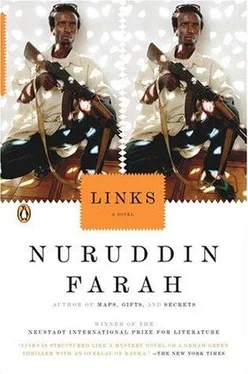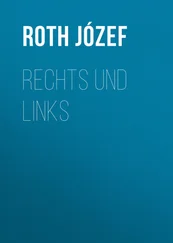Raasta looked up, his question perhaps resonating in her head, as taunts do. She said, in words carefully and properly enunciated, “Dajaal said to tell you that what needed to be done has been done.”
Even though Jeebleh understood what the words meant, he didn’t know precisely what had been done to whom. He was in no doubt, however, that Dajaal had packed a lot into the briefest of messages, which was why the two of them would have to meet and talk before he knew with any certainty what had happened. He was sure of one thing, though: The news wasn’t the kind you shared with a child so nervous as to unbuckle her sandals and dig the toes of one foot into the heel of the other. Solicitous, he wondered aloud if Raasta was okay. When she nodded, he said, “You’ve delivered a very important message, and I thank you very much,” in a tone that suggested that he wanted to get on with the rest of the day.
“Would you like me to take you to the clinic, where Uncle Bile and Uncle Seamus are, and where you are also to meet Dajaal?” she said.
“I would,” he said, “after a shower. I’ll be with you in a few minutes.”
Good as his word, he was quick about his shower, and he managed to shave, and trim the uncut side of his hair. When he emerged from the bathroom, she looked up at him and smiled, but said nothing. She led him to the clinic, without speaking, using shortcuts, her hand forever in his.
STILL HOLDING HANDS, JEEBLEH AND RAASTA WALKED IN ON BILE IN HIS consultation cubicle. They might have been lovers out on a promenade. And not having bothered to knock on the door, they gave poor Bile a startle when he saw them. Jeebleh wondered why he appeared so disturbed when seen taking pills similar to those he had taken the previous night. What were the tablets for? Were they for his depressions, or other complaints?
Bile stared at Jeebleh, then at Raasta, but didn’t say anything. His hand went to his mouth, covering it, then eventually to his chest, as though checking whether his heart was where he presumed it to be, and functioning. He was clearly at a loss for words. Sighing and still looking dumbfounded, he sat down, his face pallid, his body drained of life.
Raasta looked from Bile to Jeebleh, bewildered. But she too could not express her confusion, again because the words failed her. Her face said that she knew something terrible had happened, but she had no idea what. She seemed to sense too that the disquiet, earlier on Jeebleh’s part and now on Bile’s, differed from the uneasiness her parents were in the habit of driving each other into when they argued. This was a much more serious matter, and she had better not make inappropriate remarks, or ask infantile questions.
Bile beckoned to her to come closer. He held her at arm’s length, as though having a good look at her for the first time in years, then took her into his tight embrace, nearly hurting her. Jeebleh, not one to be left out, joined them in the hug — Raasta weepy, Bile almost ready to speak but still unable, and Jeebleh undecided.
Jeebleh stepped away from them, his thoughts drifting toward culpability, wondering what it was that had upset Bile. He leaned against a wall, listening sadly to Bile’s softly murmured words to Raasta, who was sniffling. Jeebleh became aware of the presence of a fourth person in the cubicle, a young girl. On impulse, he spoke to the sick child, whose chest was bare; her ribs protruded, her jaw was prominent, and her eyes were marked with unwashed sleep. “What’s your name, young lady?” he said.
Bile shook his head, moving it back and forth as a worshipful Sufi might. Raasta, no longer weeping, wiped her face dry with the back of her hand. She took notice of the sick child and did what she could to make her happy: she held the bony fingers in her hand, and kissed them one at a time. She continued kissing them until she brought a smile to the child’s lips, and that was heartening to watch.
Slowly the mood in the cubicle changed, and the space, with its fluorescent tube and humming generator, felt bigger and brighter. To Jeebleh, it was wonderful to see a smile gradually forming on Bile’s lips. The distant look in his friend’s eyes worried him, but there was no mileage in putting too many questions to Bile all at once, because the dark mood might descend again. It was possible that the years spent in isolation had, with this recent upheaval, begun to impose a mental imbalance on Bile, heavy depression descending on him with the cautious approach of an owl in a lighted compound.
Unable to stand the thought of seeing his friend in such a state, he prepared to leave the cubicle, to go in search of Dajaal or Shanta, hopeful that one of them might know what had caused Bile’s discomfiture. He closed the door as gently as one would the door to a room in which a child is sick, and an image etched itself on his mind: three heads dipped together, like three colts drinking side by side from the same ditch.
RAASTA TALKED UNCLE BILE THROUGH HIS DELIRIUM GENTLY. SHE KISSED him on the forehead just as it darkened with the pain trespassing there. She spoke to him as a mother might talk to a child unwilling to eat his meal. She had done so before, helped him through the worst panic attacks, helped him live out his hell in the quiet, and emerge from it, with little or no memory of what he had been through; he was capable of taking refuge in amnesia. His eyes were foggy, his mind in a mist of its own making, his thinking dogged by the formidable double-take of someone suffering the effects of guilt. He kept repeating, “Look at what they’ve made me do!”
AFTER A WHILE, BILE RID HIMSELF OF THE DEMONS, AND HIS HANDS GREW AS steady as a doctor’s again. Raasta was ready to ask him about the sick girl, who tried to get up on her feet but couldn’t stand upright; her knees wobbled, then buckled. Bile asked Raasta if she could guess the girl’s age.
Before she had time to think, Makka joined them. She held one of the sick girl’s fingers, which she touched to her own lips, and placed her head on the girl’s frail chest in a one-sided cuddle. The sick girl took Raasta’s finger — not Makka’s — and stared up at her, the pupils of her eyes not dark, almost pale.
Raasta guessed, “Five?”
“Not five,” Bile said. He sounded his usual self, congenial, convivial. At least his voice was normal, if not his posture; he leaned to one side, like a house about to collapse.
When Raasta looked at the girl again, she saw her face in a new way, and it was the face of a much older person, with no muscles, wasted. Her loose, wrinkled skin came away with your fingers if you pulled. And her belly was swollen. Raasta couldn’t recall the word Uncle had used to describe what was the matter with the girl, a big word, which sounded to her like some Italian ice cream, or a Chinese takeout meal. And what eyes she had — very large, the size of healthy onions grown in fertile land, which made you cry a lot if you cut them. The girl’s eyes were the most active part of her body, forever moving, aware, and alert to any changes around her. Except for that of her eyes, every bodily movement exhausted her, it seemed, and made her short of breath.
Raasta, Bile, and Makka stood in silence, in a circle. Raasta saw tears in the corners of Uncle’s eyes. This undermined her self-confidence: she thought she had dealt with his unease and talked him through it, released him from his troubles. She was used to her mother’s dashing out of rooms, into bathrooms or bedrooms, and crying tearfully. She might have believed Bile was weeping in sympathy with the ailing child, who hadn’t a future in the land of collective sorrow, but she knew that wasn’t true.
Suddenly the door to the cubicle opened: Seamus was there, not making the disarming entrance he often did, but remaining in the doorway, not moving. Raasta could not tell why he was staring at Uncle Bile, as fiercely as a parent might stare at a child misbehaving in public. Could it be that he was just studying Uncle? He was preparing to say something, but perhaps being polite, waiting for the right moment. His expression overflowed with such sympathy he looked as enticing as a full moon.
Читать дальше












